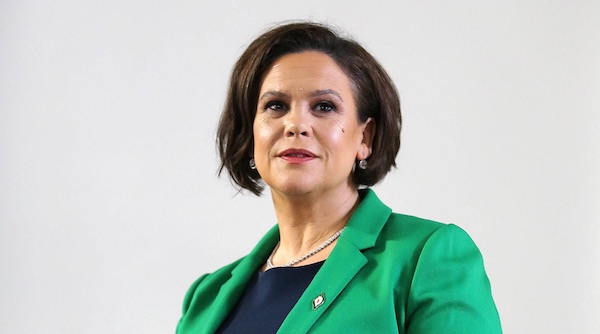
The principles of the Good Friday Agreement are now central to our future, argues Sinn Fein President Mary Lou McDonald.
The hand of history on Tony Blair’s shoulder, Bertie Ahern returning to talks having buried his mother. Gerry Adams and Martin McGuinness in deep conversation, pacing the car park, John Hume, David Trimble, Monica McWilliams, Mo Mowlam, John Alderdice - all putting in the long hours and making the hard calls.
Hope and history rhymed.
Senator George Mitchell wisely counselled that the hard work starts now. How right he was.
The partition of Ireland in 1922 created two conservative states, rife with inequality and intolerance. In the south, Home Rule became Rome Rule, just as so many unionist and Protestant people had feared and predicted. It was a cold house for Protestants, women, children and our invisible LGBT community.
It has taken generations to confront this cold, hard state but it has been confronted, challenged and transformed.
The peace and stability brought by the Good Friday Agreement has been accompanied by momentous social advancement over the last 20 years.
Dublin is a modern European capital city. While we face big challenges to build a national health service, to eradicate inequality, to safeguard rights and to ensure fairness, we are on our way, on the right path.
The northern state, a cold house for Catholics since partition, likewise has changed. The institutionalised repression and discrimination of the past is gone.
The violence which marked every decade since partition up to the signing of the Good Friday Agreement is gone.
We now have peace.
While we still have big challenges - community segregation, a denial of rights to sections of our people, the unacceptable destructive potential of Brexit - we are on our way, on the right path.
The unionist veto is gone. The notion of a perpetual unionist majority is gone, lost in the last two elections.
I write these things not to be triumphant or provocative, but because they are signposts of change.
Nothing stands still. Change is coming. It can be disorganised and chaotic, or it can be planned and organised. I believe we need to plan for change together. That is why the Good Friday Agreement, twenty years on, is central to our future. It provides a set of rules, principles and values that govern what we do today and how we shape the future.
The Agreement at its essence is about managing change; About the primacy of politics, the equal rights of citizens and a peaceful and democratic pathway to constitutional change.
I have been involved in the many negotiations following the signing of the Agreement.
Twenty years on from the signing of the Agreement, I lead Sinn Fein, a party to the Agreement. As such, I carry the responsibility, not only of protecting it, but more importantly to fully realising its potential.
There are some in the leadership of political unionism that have never supported the Agreement, who walked out of the process and who have never embraced genuine power-sharing, equality and respect.
Privately many unionists acknowledge that change is coming, that there can be no return to unionist majority rule; who understand that the Union is conditional and dependent on the consent of the people and that modernity beckons; change is upon us.
Our society is more than green and orange, we have a whole rainbow of colours and diversity of identities that make up Ireland.
The largest political parades in the North have been Pride, An Dream Dearg and the Right to Truth. Our LGBT community are not going to go away, Irish language speakers are not going to go away and victims of the conflict are not going away. These issues need to be resolved and I believe we will all be better for that.
I am an Irish Republican, a United Irelander. The united Ireland I seek is not simply adding the north on to the south. It is about a new and agreed Ireland.
An Ireland in which you can comfortably be Irish or British, or both or neither.
The united Ireland I want to build has to be home for my family and for Arlene Foster and her family.
We will not repeat the mistakes of the past. We cannot countenance the exclusion or discrimination of any section of our people in a new Ireland.
The Good Friday Agreement is relevant today for its basis of respect, equality and power-sharing.
These are the pillars of our new, united Ireland; it commits us to: “rigorous impartiality on behalf of all the people in the diversity of their identities and traditions and shall be founded on the principles of full respect for, and equality of, civil, political, social and cultural rights, of freedom from discrimination for all citizens, and of parity of esteem and of just and equal treatment for the identity, ethos, and aspirations of both communities.”
These principles must underpin governance in the north, in a newly-formed Executive, and in the political, social and economic life across Ireland.
These principles will underpin our new and united Ireland.
Honouring and delivering on these principles is the only way to get the power-sharing Executive up and running. Twenty years on, let’s honour the Good Friday Agreement by being true to it and by implementing it in full.
![[Irish Republican News]](https://republican-news.org/graphics/title_gifs/rn.gif)
![[Irish Republican News]](https://republican-news.org/graphics/title_gifs/harp.gif)

